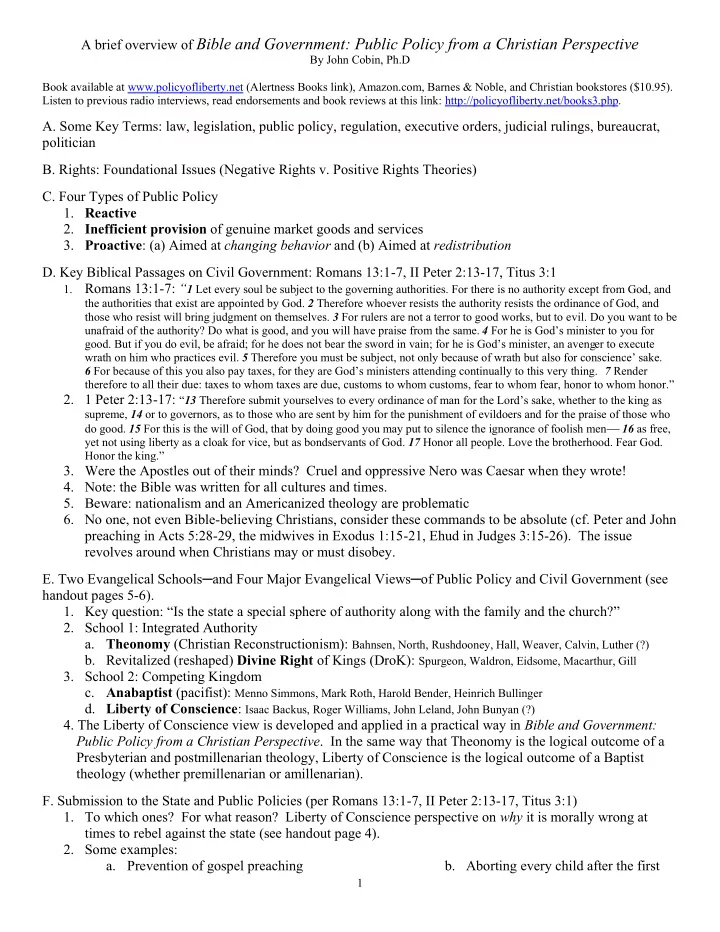

A brief overview of Bible and Government: Public Policy from a Christian Perspective By John Cobin, Ph.D Book available at www.policyofliberty.net (Alertness Books link), Amazon.com, Barnes & Noble, and Christian bookstores ($10.95). Listen to previous radio interviews, read endorsements and book reviews at this link: http://policyofliberty.net/books3.php. A. Some Key Terms: law, legislation, public policy, regulation, executive orders, judicial rulings, bureaucrat, politician B. Rights: Foundational Issues (Negative Rights v. Positive Rights Theories) C. Four Types of Public Policy 1. Reactive 2. Inefficient provision of genuine market goods and services 3. Proactive : (a) Aimed at changing behavior and (b) Aimed at redistribution D. Key Biblical Passages on Civil Government: Romans 13:1-7, II Peter 2:13-17, Titus 3:1 1. Romans 13:1-7: “ 1 Let every soul be subject to the governing authorities. For there is no authority except from God, and the authorities that exist are appointed by God. 2 Therefore whoever resists the authority resists the ordinance of God, and those who resist will bring judgment on themselves. 3 For rulers are not a terror to good works, but to evil. Do you want to be unafraid of the authority? Do what is good, and you will have praise from the same. 4 For he is God’s minister to you for good. But if you do evil, be afraid; for he does not bear the sword in vain; for he is God’s minister, an aveng er to execute wrath on him who practices evil. 5 Therefore you must be subject, not only because of wrath but also for conscience’ sake. 6 For because of this you also pay taxes, for they are God’s ministers attending continually to this very thing. 7 Render therefore to all their due: taxes to whom taxes are due, customs to whom customs, fear to whom fear, honor to whom honor.” 2. 1 Peter 2:13-17: “ 13 Therefore submit yourselves to every ordinance of man for the Lord’s sake, whether to the king as supreme, 14 or to governors, as to those who are sent by him for the punishment of evildoers and for the praise of those who do good. 15 For this is the will of God, that by doing good you may put to silence the ignorance of foolish men 16 as free, yet not using liberty as a cloak for vice, but as bondservants of God. 17 Honor all people. Love the brotherhood. Fear God. Honor the king. ” 3. Were the Apostles out of their minds? Cruel and oppressive Nero was Caesar when they wrote! 4. Note: the Bible was written for all cultures and times. 5. Beware: nationalism and an Americanized theology are problematic 6. No one, not even Bible-believing Christians, consider these commands to be absolute (cf. Peter and John preaching in Acts 5:28-29, the midwives in Exodus 1:15-21, Ehud in Judges 3:15-26). The issue revolves around when Christians may or must disobey. E. Two Evangelical Schools ─and Four Major Evangelical Views─of Public Policy and Civil Government (see handout pages 5-6). 1. Key question: “Is the state a special sphere of authority along with the family and the church?” 2. School 1: Integrated Authority a. Theonomy (Christian Reconstructionism): Bahnsen, North, Rushdooney, Hall, Weaver, Calvin, Luther (?) b. Revitalized (reshaped) Divine Right of Kings (DroK): Spurgeon, Waldron, Eidsome, Macarthur, Gill 3. School 2: Competing Kingdom c. Anabaptist (pacifist): Menno Simmons, Mark Roth, Harold Bender, Heinrich Bullinger d. Liberty of Conscience : Isaac Backus, Roger Williams, John Leland, John Bunyan (?) 4. The Liberty of Conscience view is developed and applied in a practical way in Bible and Government: Public Policy from a Christian Perspective . In the same way that Theonomy is the logical outcome of a Presbyterian and postmillenarian theology, Liberty of Conscience is the logical outcome of a Baptist theology (whether premillenarian or amillenarian). F. Submission to the State and Public Policies (per Romans 13:1-7, II Peter 2:13-17, Titus 3:1) 1. To which ones? For what reason? Liberty of Conscience perspective on why it is morally wrong at times to rebel against the state (see handout page 4). 2. Some examples: a. Prevention of gospel preaching b. Aborting every child after the first 1
Recommend
More recommend